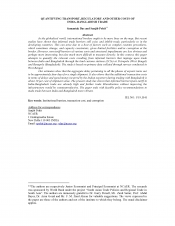Quantifying Transport Regulatory and other Costs of India-Bangladesh trade
Sanjib Pohit
Samantak Das
November 2002
In the globalised world, international borders ought to be mere lines on the map. But recent studies have shown that informal trade barriers still exist, and inhibit trade, particularly so in the developing countries. This can arise due to a host of factors such as complex customs procedures, which sometimes change, and capacity constraints, given limited facilities and/or corruption at the border. However, non-tariff barriers of various sorts and structural impediments are less obvious and perhaps more interesting, but also much more difficult to measure directly. In this context, this paper attempts to quantify the relevant costs resulting from informal barriers that impinge upon trade between India and Bangladesh through the land customs stations (LCSs) at Petrapole (West Bengal) and Benapole (Bangladesh). The study is based on primary data collated through surveys conducted in West Bengal. Our estimates show that the aggregate delay pertaining to all the phases of exports turns out to be approximately four days for a single shipment. It also shows that the additional transaction costs in terms of delays and speed money incurred by the Indian exporters during trading with Bangladesh is about 10 per cent of shipment value. The present study has shown that informal barriers/para-tariff in India-Bangladesh trade are already high and further trade liberalisation without improving the infrastructure would be counterproductive. The paper ends with feasible policy recommendations to make trade between India and Bangladesh more vibrant.
National Growth and Macroeconomic Centre
States, Sectors, Surveys, and Impact Evaluation







